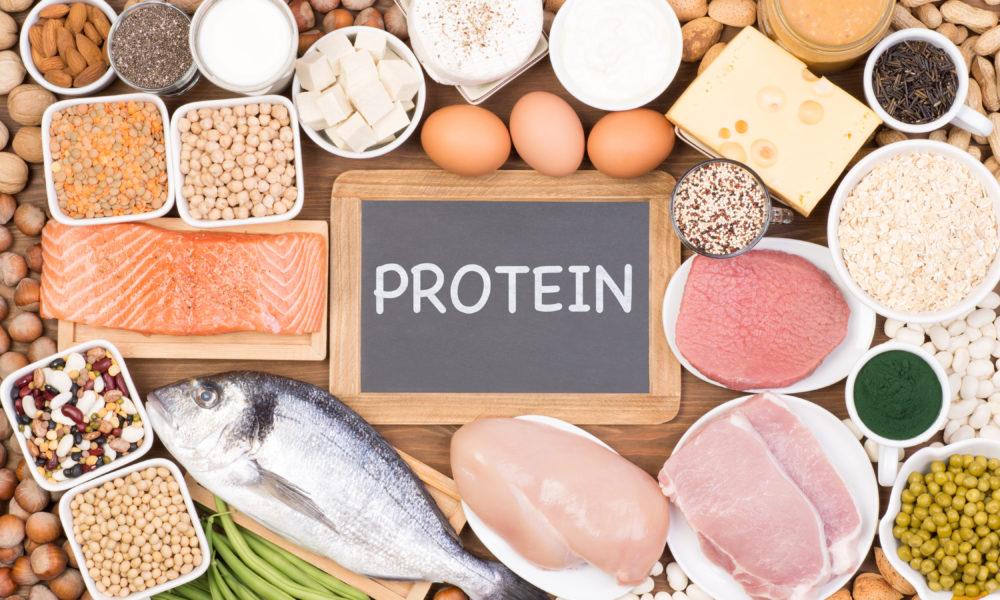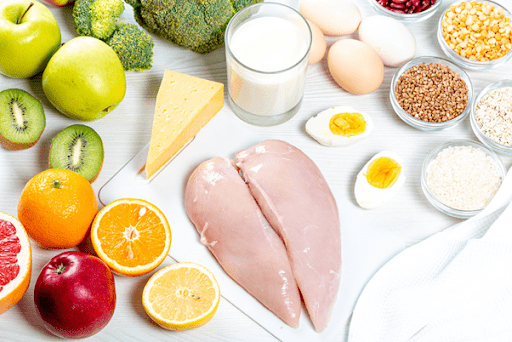- Messages
- 2,405
- Reaction score
- 1,431
- Points
- 113

The last thing you want to do is deprive your body of essential protein. Protein is a vital nutrient that helps build and repair your muscles, organs, and other tissues. It also helps transport nutrients and oxygen throughout the body.
Protein is found in various foods such as meat, eggs, beans, nuts, seeds, tofu, and soy milk. The best way to get enough protein is by eating a balanced diet with plenty of high-quality protein sources.
To learn more about protein, this article discusses the importance of protein, its sources, benefits, and the amount you should consume daily.
But before that, let’s look at the following:
WHAT IS PROTEIN
Protein is one of the macronutrients your body needs in large amounts to grow and repair itself. It also plays a vital role in maintaining muscle mass, blood sugar levels, and heart health.
Protein is made up of amino acids (the building blocks of protein), which are necessary for the proper functioning of the human body and its systems.
The amino acids can be combined in many ways to make different proteins. This shape determines the function of the protein. For example, hemoglobin is responsible for carrying oxygen in the blood, while insulin regulates blood sugar levels.
Some proteins have multiple functions, such as enzymes and hormones, while others have just one role, such as hemoglobin or myelin sheath.
There are 20 amino acids used to make muscle and other tissues in the body. Among the 20 amino acids, nine are the “essential” amino acids that must be obtained in the diet because your body cannot synthesize them.
The table below shows Essential VS Non-Essential Protein
| Essential Amino Acids | Non-Essential Amino Acids |
|---|---|
| Histidine | Serine |
| Threonine | Arginine |
| Leucine | Glutamine |
| Lysine | Alanine |
| Phenylalanine | Asparagine |
| Tryptophan | Aspartate |
| Isoleucine | Glycine |
| Methionine | Proline |
| Valine | Cysteine |
| Glutamate | |
| Taurine | |
| Tyrosine |
Proteins can be divided into complete and incomplete proteins. Complete proteins contain all nine essential amino acids needed for human health. They are found in animal-based foods like eggs, dairy products, meat, fish, and poultry.
Complete protein sources include dairy products like milk and cheese, yogurt, and soy products such as tofu and tempeh.
Incomplete proteins lack one or more of these essential amino acids. They may be found in plant-based foods like legumes or grains.
Animal foods have more complete proteins than plant foods because animal sources contain all nine essential amino acids. In contrast, plants only contain some essential amino acids.
However, they can be fortified with complete protein through processing like cooking or baking or adding them after cooking with other foods such as grains or beans/legumes.
WHAT ARE THE SOURCES OF PROTEIN?
The healthiest way to get enough protein is to eat a variety of sources of protein, including animal and plant foods, throughout the day. This will ensure that you provide your body with all the amino acids needed for healthy functioning. Some good protein sources include:
- Meat and poultry: Beef, pork, lamb, and chicken. Limit red meat as much as possible because it tends to be high in saturated fat.
- Fish (seafood): Salmon, trout, tuna, and halibut are all excellent sources of omega-3 fatty acids essential for health.
- Eggs: Eggs contain all eight essential amino acids, and they’re also a great source of iron
- Protein supplements include soy protein products, whey protein powder, casein protein powder, eggs and many others.
- Seeds and nuts
- Legumes such as beans and peas
- Low-fat dairy products like cheese, milk and yogurt
You do not have to eat foods providing all of the required amino acids at every meal. Your body can utilize amino acids from previous food to create complete proteins.
Low-protein foods are those that give 5% or less of the user’s daily value (DV), while Foods containing 20% DV and more are regarded as rich in protein.

ADVANTAGES OF PROTEIN
Protein is essential for good health and well-being. It provides energy, builds and repairs tissues and organs, and helps the immune system fight infections. Proteins also have many health benefits throughout your body, including:
BUILDING AND REPAIRING MUSCLE
Protein helps build muscles, which is the primary purpose of weight training. It also plays a crucial role in the recovery after a workout session.
Protein also helps repair damaged tissue and organs during a workout or when you are under stress. When your muscles experience microtrauma (small tears), they increase their size and strength by repairing themselves with protein.
HELP WITH FAT LOSS
Protein helps you feel full longer and prevents overeating. This gives you more control over your eating habits and can help you lose weight faster than sticking with low- or no-protein meals.
Protein also keeps you satisfied longer. Eating protein-rich foods, such as chicken breast or steak, takes longer to digest than other foods. They keep your appetite at bay until the next meal or snack time.
INCREASES MUSCLE MASS AND STRENGTH
Protein is the primary structural component of your muscles. It helps maintain muscle mass and promote muscle growth by helping you recover from exercise faster.
Protein also increases aerobic endurance and strength, so athletes often recommend eating more protein before competitions.
Numerous studies have found that eating a high-protein diet can assist build muscle mass and strength.
REGULATES BLOOD SUGAR LEVELS
Proteins help convert carbohydrates into glucose which helps with metabolism. This also helps regulate blood sugar levels in people with diabetes or hypoglycemia (low blood sugar) conditions such as gestational diabetes or pre-diabetes.
In a review, researchers found that high protein intake reduced systolic blood pressure by a mean of 1.76 mm Hg and diastolic blood pressure by an average of 1.15 mm Hg.
Another study also discovered that a high-protein diet lowered triglycerides and LDL (bad) cholesterol while reducing blood pressure.
PROTEIN HELPS MAINTAIN BONE DENSITY
A protein-rich diet can help prevent osteoporosis by building strong bones and reducing your risk of osteoporosis by improving calcium absorption from your bones into your bloodstream.
Since calcium helps maintain bone density, having enough calcium in your diet will be essential in maintaining healthy bones as you age.

Young woman and man drinking protein shake after workout
WHY IS PROTEIN IMPORTANT?
The following are the reasons protein is important to your body.
1. ENHANCING THE IMMUNE SYSTEM
Proteins aid in the formation of immune cells, or antibodies, which aid in the fight against infection.
When destructive foreign invaders penetrate your cells, your immune system makes antibodies that recognize the foreign substances for destruction. Without the antibodies, germs and viruses would be able to grow uncontrolled and infect your body to the point where it would become ill.
After the body has produced the antibodies for a particular invader (virus and bacteria), it still produces the antibodies next time. This makes it possible for the antibodies to react rapidly the next time a specific disease agent enters your body.
Protein also helps increase red blood cell levels, which reduces blood pressure and increases blood flow to vital organs like the heart and brain.
2. TRANSPORT AND STORES NUTRIENTS
Proteins are essential in transporting nutrients through the bloodstream into cells to be used as fuel or stored as fat reserves for later use if needed. They transport nutrients such as oxygen, vitamins, minerals cholesterol.
For instance, the hemoglobin protein transports oxygen from the lungs to body tissues, while lipoproteins carry cholesterol and other fats in your blood.
Protein takes a lot longer to break down into its component amino acids (building blocks), so it can be stored for future use by muscles or organs for energy when needed later, such as when exercising intensely.
3. GROWTH AND MAINTENANCE
Protein is needed to grow, develop and maintain all body tissues and organs. It is also used to build new cells and repair damaged ones caused by physical damage or illness.
During growth and maintenance, your body usually breaks down the same amount of protein used to repair and damage cells to facilitate development and maintenance.
In the case of illness, it breaks down more protein than it can produce for usage, increasing protein demand in your body. And since the body cannot create protein, you need to get it from food or supplements. More protein breakdown usually happens during illness or surgery.
4. BALANCES BODY FLUIDS
Proteins control bodily functions to keep fluids balanced. Albumin and globulin proteins help maintain your body’s fluid balance by drawing and retaining water.
You will eventually have lower albumin and globulin levels if you don’t consume sufficient protein.
5. PROTEIN PROVIDES ENERGY
Proteins provide energy to the body by acting as an alternative fuel source when carbohydrate intake is low or unavailable.
It breaks down the skeletal muscles into amino acids to provide energy in case of low or lack of carbohydrates or fats, which are the most suitable energy sources for your body. This may happen following intense activity or if you don’t eat enough calories or are in a state of fasting.
CONCLUSION
The human body needs protein for various reasons, like building muscles and producing neurotransmitters and hormones. It can be found in seafood, dairy products, meat, supplements, and legumes. However, some are more protein-rich than others, like in the case of complete and incomplete proteins.
To get enough proteins in your body, you should consume more than 10% of your calories from protein. It helps with muscle recovery after exercise, which makes it an important part of any fitness routine.

